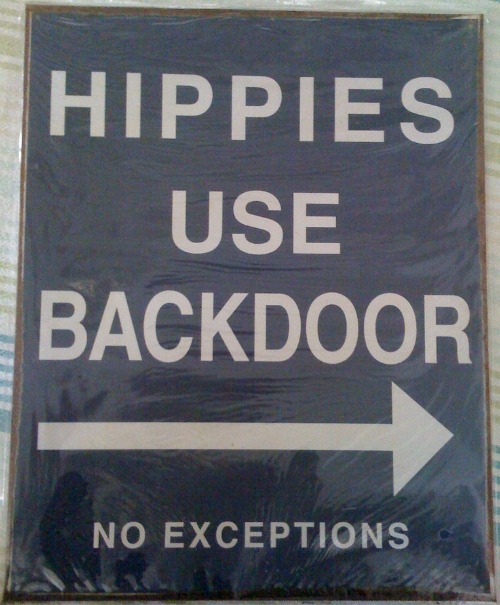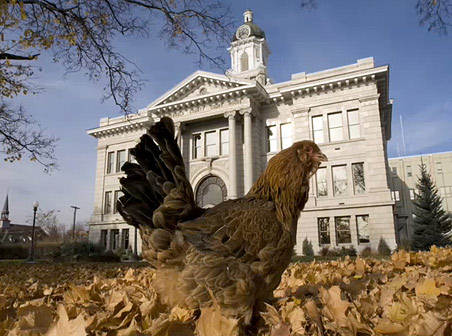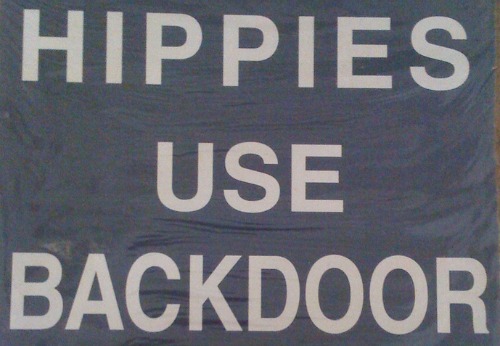 Photo: Pierre-Olivier CarlesOne conservative talking point that crops up with increasing frequency is that by using EPA to regulate greenhouse gases, Obama is effectively short-circuiting democracy, doing via regulatory fiat what Democrats could not accomplish via legislation. The Tea Party right is calling it “backdoor cap-and-trade.” Similar sentiment is reaching even the more reasonable quarters of conservative thought — James Joyner says it’s a “unilateral decision arguably outside the scope of [the president’s] Constitutional power” and Conor Friedersdorf cast it as “disregarding separation of powers.”
Photo: Pierre-Olivier CarlesOne conservative talking point that crops up with increasing frequency is that by using EPA to regulate greenhouse gases, Obama is effectively short-circuiting democracy, doing via regulatory fiat what Democrats could not accomplish via legislation. The Tea Party right is calling it “backdoor cap-and-trade.” Similar sentiment is reaching even the more reasonable quarters of conservative thought — James Joyner says it’s a “unilateral decision arguably outside the scope of [the president’s] Constitutional power” and Conor Friedersdorf cast it as “disregarding separation of powers.”
This way of framing things has certain intuitive appeal as long as you don’t know much about what climate legislation would have done, what EPA plans to do, or the legal environment in which EPA is acting. Unfortunately, this describes the vast bulk of the U.S. political commentariat and, God help us, most legislators. From their distant and ideologically inflected perspective, one “carbon something something” is the same as another.
Just for the record, then, let’s put the “backdoor cap-and-trade” myth to rest.
The EPA is under legal obligation to act
The Clean Air Act was passed in 1963. Here’s what Section 202(a)(1) says:
[EPA] Administrator shall by regulation prescribe (and from time to time revise) … standards applicable to the emission of any air pollutant from any class or classes of new motor vehicles or new motor vehicle engines, which in his judgment cause, or contribute to, air pollution which may reasonably be anticipated to endanger public health or welfare.
As you can see, the language of the statute is both broad (“any air pollutant”) and unambiguous (“shall”). The EPA administrator is given broad latitude to make a judgment on whether a particular motor vehicle pollutant threatens public health; if it does, the administrator must “prescribe standards.” (If a pollutant is determined to threaten public health when emitted from motor vehicles, it automatically qualifies as a pollutant from stationary sources like power plants as well.) The law is intended, by careful construction, to apply to air pollutants that scientists in 1963 might not yet have been aware of.
That is the law of the land. Yet it raises a question: Do greenhouse gases qualify as air pollutants under the Clean Air Act? They are different in significant ways from familiar air pollutants like smog; are those differences legally significant?
This question was litigated all the way to the Supreme Court, which decided, in 2007’s Massachusetts v. EPA, that yes, greenhouse gases qualify as air pollutants under the Clean Air Act. Now, people have strong opinions about whether this was the right decision. Many on the right disagree with it passionately. Nonetheless, it has been settled, and in a constitutionally scrupulous way. The Supreme Court ruled on a law from Congress — no executive overreach involved.
If greenhouse gases are pollutants, the court said, then the EPA administrator must determine whether they endanger public health. In the case of greenhouse gases, conservative conspiracy theories aside, the only responsible answer to that question is in the affirmative, and that is what EPA scientists concluded in the agency’s March 2009 “endangerment finding.”
The court ruled that greenhouse gases are air pollutants and scientists judged them a danger to public health — that means the EPA administrator “shall by regulation prescribe (and from time to time revise) … standards” for them. She is bound to do so by law, and that is what Lisa Jackson is doing. Far from making a “unilateral” decision, she is acting in response to legal obligations imposed by Congress and the courts. It is perfectly commensurate with separation of powers and fully within the executive branch’s constitutional powers, unless Joyner has some reason to think the Clean Air Act is unconstitutional (who knows, they think everything’s unconstitutional these days).
EPA regulations are not cap-and-trade
There are different ways the EPA could have responded to its legal obligation to regulate greenhouse gases. (I wrote a backgrounder on the details of EPA powers.)
If it wanted to get really radical, it could have regulated them under National Ambient Air Quality Standards, per Section 108 of the Clean Air Act. The agency could have said that, say, 350 parts per million is the safe ambient level of CO2 in the air. That would have effectively put the entire country in noncompliance and triggered what really would have been a massive expansion of EPA’s reach. The Center for Biological Diversity has been pushing for this approach for a while.
Or, some people argue, EPA could have done what most economists agree is the sensible thing and established a cap-and-trade program on its own. Think tanky groups like the Constitutional Accountability Center and the Institute for Policy Integrity argued that the Clean Air Act gives EPA that power. Of course, that would have been politically explosive too.
It did neither of those. Instead EPA is taking a cautious approach, getting at greenhouse gases largely through performance standards that, by the agency’s own avowal, will mostly require upgrades in efficiency (which often as not will make money for participating facilities).
In short, given its legal mandate to address greenhouse gases, EPA is acting with about as much caution and restraint as it possibly can, short of doing what the Bush administration did, which was dissemble and delay.
This is not some sort of power grab by Obama. It is not an attempt to do by regulation what legislation would have done. Legislation would have substantially reduced greenhouse gases; EPA regulations will lower them modestly if at all.
This is just an executive branch agency charged with protecting public health doing what Congress told it to do.
——
UPDATE: See also this excellent post on Firedoglake: “The GOP/Right Wing Wurlitzer’s Latest Big Lie: “EPA Power Grab’.”



